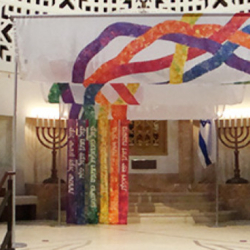Contributor(s): Shared on: Categories: Tags: | Source (Hebrew) | Translation (English) | Transliteration (Romanized Hebrew) |
|---|
|
Person called to the Torah: | |
בָּרְכוּ אֶת יָהּ הַמְבֹרֶכֶת
|
Bless Yah, the blessed one. |
Barkhu et YAHH hamvorekhet.
| |
The congregation responds | |
בְּרוּכָה יָהּ הַמְבֹרֶכֶת לְעוֹלָם וָעֶד
|
Bless Yah, the blessed one, forever. |
Brukha YAHH hamvorekhet le’olam va’ed.
| |
Say the blessing: | |
בְּרוּכָה יָהּ הַמְבֹרֶכֶת לְעוֹלָם וָעֶד
בְּרוּכָה אַתְּ יָהּ אֱלֹהָתֵינוּ רוּחַ הָעוֹלָם
אֲשֶׁר קֵרְבָתְנוּ לַעֲבוֹדָתָהּ.
וְנָתְנָה לָנוּ אֶת תּוֹרָתָהּ.
בְּרוּכָה אַתְּ יָהּ נוֹתֶנֶת הַתּוֹרָה׃
|
Bless Yah, the blessed one, forever.
Blessed are you, Yah,
who has drawn us near to your service
and has given us the Torah.
Blessed are you, Yah, giver of the Torah. |
Brukhah YAHH hamvorekhet le’olam va’ed.
Brukhah at YAHH elohateinu ruaḥ ha’olam
asher keirvatnu la’avodatahh
venatnah lanu et Toratahh
Brukhah at YAHH notenet haTorah.
| |
When the reading is finished, touch the place the reading ended with your tsitsit.
Person called to the Torah: | |
בְּרוּכָה אַתְּ יָה אֱלֹהָתֵינוּ רוּחַ הָעוֹלָם
אֲשֶׁר נָתְנָה לָנוּ תּוֹרַת אֶמֶת
וְחַיֵּי עוֹלָם נָטְעָה בְּתוֹכֵנוּ.
בְּרוּכָה אַתְּ יָהּ נוֹתֶנֶת הַתּוֹרָה׃
|
Yah, the blessed one, Your presence fills creation
You gave us the Torah of truth
and implanted eternal life within us.
Blessed are you, Yah, giver of Torah. |
Brukhah at YAHH Elohateinu ruaḥ ha’olam
asher natnah lanu Torat emet
veḥayey olam nat’ah betoḥeinu.
Brukhah at YAHH notenet haTorah.
| |
At this point, move to the other side of the Reader. The next aliyah will be called and then you will receive a Mi Sheberaḥ (a blessing). You then stand through the next reading. Return slowly to your seat when the next aliyah moves to the left of the Reader. (The reason for this is that you are in a hurry to get to the Torah, but reluctant to leave it.) | |
Rabbi Zalman Schachter-Shalomi, Reb Arthur Waskow, and others helped to formulate this grammatically feminine Hebrew blessing for an oleh in their blessing over the Torah reading, in the early years of Congregation Mishkan Shalom in Philadelphia (1988-1993). Source Torah Blessings (Divine Feminine) at Mishkan Shalom, Philadelphia
 Rabbi Dr. Zalman Meshullam Schachter-Shalomi, affectionately known as "Reb Zalman" (28 August 1924 – 3 July 2014) was one of the founders of the Jewish Renewal movement. Born in Żółkiew, Poland (now Ukraine) and raised in Vienna, he was interned in detention camps under the Vichy Regime but managed to flee the Nazi advance, emigrating to the United States in 1941. He was ordained as an Orthodox rabbi in 1947 within the ḤaBaD Hasidic movement while under the leadership of the sixth Lubavitcher Rebbe, Yosef Yitzchok Schneersohn, and served ḤaBaD communities in Massachusetts and Connecticut. He subsequently earned an M.A. in psychology of religion at Boston University, and a doctorate from the Hebrew Union College. He was initially sent out to speak on college campuses by the Lubavitcher Rebbe, but in the early 1960s, after experimenting with "the sacramental value of lysergic acid", the main ingredient in LSD, leadership within ḤaBaD circles cut ties with him. He continued teaching the Torah of Ḥassidut until the end of his life to creative, free and open-minded Jewish thinkers with humility and kindness and established warm ecumenical ties as well. In September 2009, he became the first contributor of a siddur to the Open Siddur Project database of Jewish liturgy and related work. Reb Zalman supported the Open Siddur Project telling its founder, "this is what I've been looking forward to!" and sharing among many additional works of liturgy, an interview he had with Havurah magazine in the early to mid-1980s detailing his vision of " Database Davenen." The Open Siddur Project is proud to be realizing one of Reb Zalman's long held dreams. Rabbi Arthur Waskow is the director of The Shalom Center. In 2013, Rabbi Waskow received T’ruah’s first Lifetime Achievement Award as a “Human Rights Hero.” His chapter, “Jewish Environmental Ethics: Adam and Adamah,” appears in Oxford Handbook of Jewish Ethics and Morality (Dorff & Crane, eds.; Oxford Univ. Press, 2013). Rabbi Waskow is the author of 22 books including Godwrestling, Seasons of Our Joy (JPS, 2012), and Down-to-Earth Judaism: Food, Money, Sex, and the Rest of Life. With Sister Joan Chittister and Murshid Saadi Shakur Chisht he co-authored The Tent of Abraham: Stories of Hope and Peace for Jews, Christians, and Muslims, and with with Rabbi Phyllis Berman wrote Freedom Journeys: Exodus & Wilderness Across Millennia (Jewish Lts, 2011). He edited Torah of the Earth (two volumes, eco-Jewish thought from earliest Torah to our own generation). These pioneering books on eco-Judaism are available at discount from “ Shouk Shalom,” The Shalom center's online bookstore. Mishkan Shalom, founded in 1988, is a Reconstructionist synagogue located in the Roxborough-Manayunk neighborhood of Philadelphia, dedicated to repair of the world through prayer, study and acts of caring. Read a comment / Leave a comment (moderated) Works of related interest: |












Leave a Reply